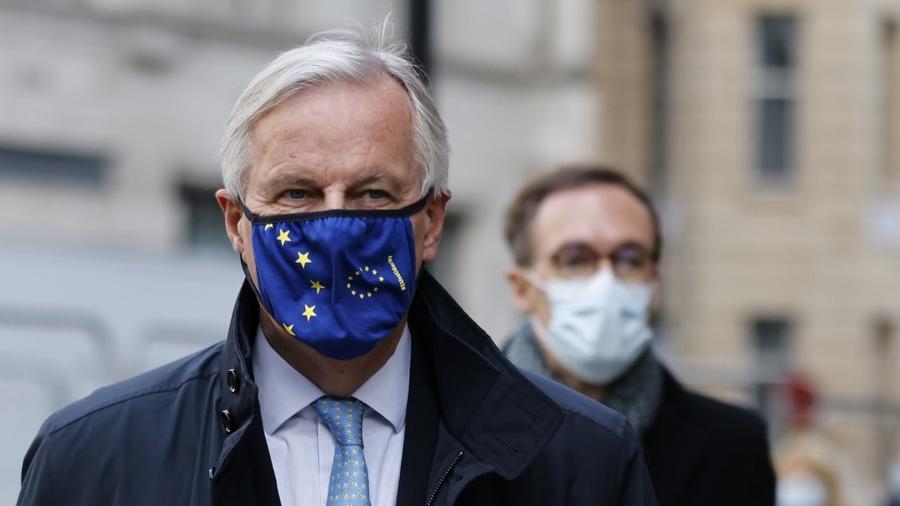 EU chief negotiator Michel Barnier wearing a face mask because of the novel coronavirus pandemic leaves a conference centre as talks continue between the EU and the UK in London on Nov 12, 2020. (Tolga Akmen / AFP)
EU chief negotiator Michel Barnier wearing a face mask because of the novel coronavirus pandemic leaves a conference centre as talks continue between the EU and the UK in London on Nov 12, 2020. (Tolga Akmen / AFP)
British and European Union negotiators are racing to strike a post-Brexit trade deal before the end of the week, with officials on both sides saying the outcome is still too close to call.
While intensive, round-the-clock talks in London are making progress, genuine disagreement remains on the two biggest obstacles to an agreement, meaning it’s impossible to predict an outcome with any certainty, people with knowledge of the discussions said. However, two officials said the general mood on both sides is one of optimism.
While intensive, round-the-clock talks in London are making progress, genuine disagreement remains on the two biggest obstacles to an agreement, meaning it’s impossible to predict an outcome with any certainty, people with knowledge of the discussions said
The EU’s chief negotiator, Michel Barnier, will brief diplomats from the bloc’s 27 member states on Wednesday on the progress of the negotiations.
The next few days are crucial, with the UK and EU teams hoping that an agreement can be reached on Friday or over the weekend, officials said. One said that while a final picture was beginning to emerge, the situation remains incredibly delicate.
People familiar with the EU position said negotiators are trying to avoid talks running into next week to prevent them having an impact on preparations for a summit of EU leaders that starts on Dec 10.
ALSO READ: Britain, EU say time is running out for Brexit trade deal
Not only are European governments occupied with a row over the EU budget, the bloc’s negotiating team, led by Barnier, is concerned that presenting leaders with anything other than a signed-and-sealed deal would leave an agreement vulnerable to being unpicked at the last moment.
The EU has outsourced its negotiating to Barnier and the European Commission, and some countries -- especially France and the Netherlands -- are uneasy about what sort of compromises are being made in their name, one EU official said.
‘So Tricky’
Commission President Ursula von der Leyen said on Tuesday that the negotiations are “so tricky and so difficult” but they should reach a conclusion soon. The EU is “well prepared” for any outcome, “and we will see in the next days how things turn out,” she said.
While deadlines have come and gone throughout the negotiating process, this period is being seen as the real endgame, officials on both sides said. The talks, which have been going on since March, need to finish within days if the UK and EU parliaments are to have time to ratify any agreement before Britain leaves the EU’s single market on Dec 31.
ALSO READ: UK rejects latest EU fisheries offer with talks set to resume
If the two sides fail to reach an accord by then, businesses and consumers will be left facing the cost and disruption of tariffs and quotas, while relations between the UK and EU risk being poisoned for a generation.
Officials in Brussels said that planned UK legislation giving the government powers to unilaterally rewrite parts of the Brexit Withdrawal Agreement could yet prompt the EU to balk at ratifying any deal. They expressed hope that Britain will delete the most controversial clauses from the bill if a deal is reached.
Macron Warning
The two biggest obstacles to a trade deal remain what access EU boats will have to British fishing waters and the level competitive playing field for business -- but progress has been made on both in the last few days, officials said.
On fisheries, the UK is holding out for greater control over its stocks, something the government sees as a matter of sovereignty. An agreement on the issue is a precondition for any wider accord, but President Emmanuel Macron has warned that France won’t allow a deal that fails to respect its interests.
ALSO READ: Brexit: Barnier heads to London for talks, warns of divergences
Compromises being discussed include delaying any changes to quota allocations and phasing them in gradually over time. But efforts to reach an agreement on the subject are being hindered both by EU countries’ claims to historic rights to fish in certain areas, and the UK’s demand to make access conditional on annual negotiations, one official said.
On the level playing field, the two sides are trying to establish a system in which UK environment and labor standards can evolve in a similar way to the EU’s but which allows the British government to have full control over them.
UK Prime Minister Boris Johnson’s spokesman, Jamie Davies, told reporters on Tuesday that the government is working hard to bridge the differences with the EU.
READ MORE: Brexit: UK says no return to EU negotiations next year


